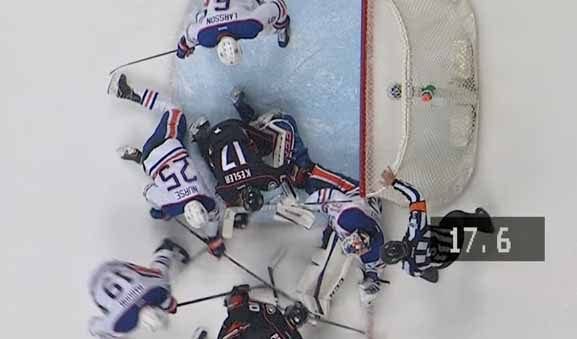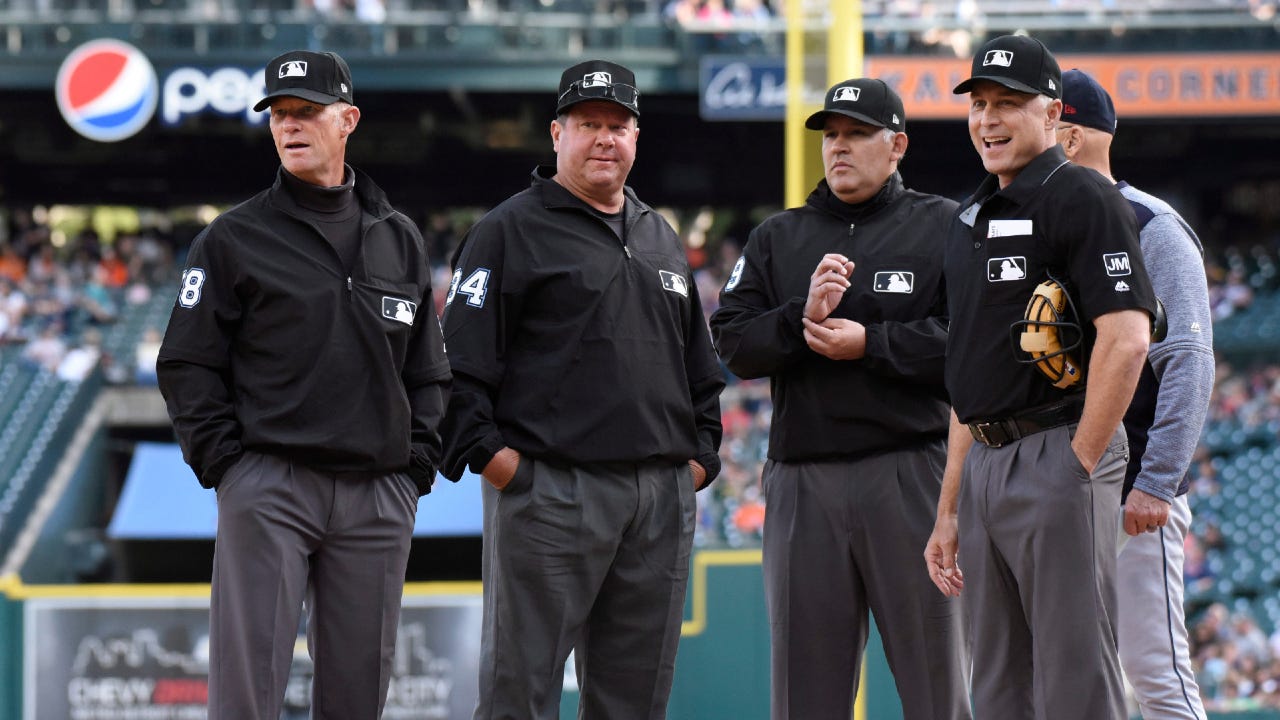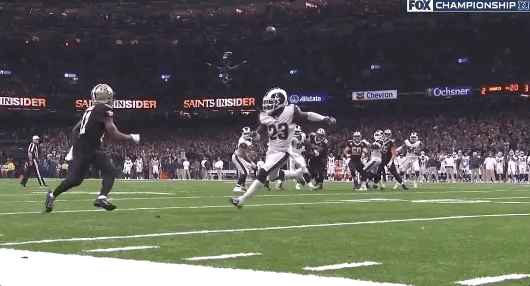The Ref Show
Blown calls at crucial times and the philosophy of "game management" are threatening the enjoyability of pro sports.
If you tuned into any sports channel over the last few days and/or are a fan of baseball, you’re probably well aware of the controversy that took place earlier this week in game 5 of the NLDS between the San Francisco Giants and Los Angeles Dodgers. With the series tied 2-2, this was a winner take all game. The Dodgers held a 2-1 lead in the 9th inning, and the game ended on a botched checked swing call that was no where close to being an actual swing.
This was obviously not the only horrendous call made in a baseball game this year, and it turns out it wasn’t even the only bad checked swing call involving the Giants and Dodgers. The Giants stole a regular season win against the Dodgers in July off of a checked swing that actually was a swing but wasn’t called as such. That might not seem as significant since it wasn’t an elimination game, but interestingly enough the Dodgers and Giants play in the same division which the Giants ended up winning by finishing with, you guessed it, one more win than the Dodgers, thus affecting playoff seeding. Some people (probably Dodgers fans) might view this as poetic justice. But the real question is why did both game-altering calls even have to occur in the first place?
Expecting umpires and referees to be perfect is obviously unrealistic, and a few bad calls here and there aren’t the main concern. It’s the fact that in the major North American professional sports leagues there have been an increasing number of wrong calls in crucial moments that impact not just the outcome of a game but teams’ entire seasons. On top of that, there is a belief among some officials that part of their job is to “manage the game”, rather than just calling infractions regardless of when they occur.
There are plenty of recent examples in the NHL and NFL that come to mind where an outcome was directly affected by a wrong call. One was a missed pass interference penalty in the 2018-19 NFC Championship Game between the New Orleans Saints and Los Angeles Rams with the game tied. Had it been called, the Saints would have been awarded a 1st down inside the 5 yard line and been able to run down the clock before kicking a game winning field goal. Instead, they had to kick a field goal immediately which gave the Rams nearly 2 minutes to drive down the field and tie the game with a field goal. The Rams then won the game in overtime, clinching their spot in the Super Bowl.
In the NHL, several high profile incidents have taken place in just the last few years. In game 5 of the 2019 Stanley Cup Final, a blatant tripping penalty was taken by the St. Louis Blues and not called, despite a referee staring right at the play. This was followed immediately by the Blues scoring what ended up being the game winning goal to take a 3-2 series lead over the Boston Bruins. St. Louis also went on to win the series 4-3.
Similarly, in a 2017 series between the Edmonton Oilers and Anaheim Ducks, a pretty clear goalie interference penalty by the Ducks went uncalled and resulted in the tying goal being scored in the final seconds of game 5. Anaheim went on to win the game and series.

In a 2019 game 7 between the San Jose Sharks and Vegas Golden Knights in which Vegas led 3-0 in the 3rd period, a 5 minute penalty was called on Vegas for a play in which Joe Pavelski of the Sharks was knocked down and bleeding from a cut by his visor upon impact with the ice. The refs called this a “cross checking resulting in significant injury” major, and San Jose scored 4 times on the 5 minute power play to win the game and series.
If you still think there isn’t a problem then consider this: the Seattle Kraken got a taste of it in their first ever game this week, when they lost to the Vegas Golden Knights on a late game-winning goal that was one of the most obvious kicks you’ve ever seen but still counted even after review. Welcome to the NHL, Seattle!


There are probably more examples I’ve forgotten, as these were just the notable ones in my memory. Another problem with officiating lately, at least in the NHL, NBA, and NFL has been the pervasiveness of game management that I alluded to earlier. Generally, it’s the idea that referees should try to keep things as fair as possible by calling “make-up” penalties and such. For example, if a penalty call is made that on second look maybe shouldn’t have been called, the refs will often call a similarly weak penalty against the other team a little later on to even things up. It could also be a missed call on one team that leads to the referees “letting it go” later when the other team commits a similar infraction.
In theory this makes sense, but the problem is that in most games the referees set a standard early on for how things are going to be called (i.e., strictly, moderately, not strict at all). As soon as a make-up calls (or non-calls) needs to be made, the refs are deliberately violating their own standard that they set earlier, which leads to inconsistency and the appearance of unduly interfering with the game. An example of this occurred in last year’s NFC Championship Game between the Green Bay Packers and Tampa Bay Buccaneers (pictured below). Even the notion of a “standard” for making calls is somewhat problematic because it’s impossible to know the extent to which the rules will be enforced in a game before it starts.

Ironically, despite everyone from fans to players to coaches to referees recognizing these truths, a veteran NHL referee was fired last year for saying the quiet part out loud by admitting mid-game that he purposely called a weak penalty as part of a game management strategy. The absurdity is that he was probably only fired because the comments got caught on live TV, hence reaching a general audience. If just the players had heard it, or even if he had said nothing and made an even worse call that changed the outcome of a playoff game, he would probably still have a job right now.
So what’s the solution? For me, the most obvious would be to at least make all calls reviewable. If video technology exists, there’s no reason why it shouldn’t be used for something like a checked swing, or goaltending in basketball. An extension of this is to have a video crew automatically reviewing plays, similar to the new video assistant referee (VAR) system in soccer. The NHL has already done this for goals. If the puck crosses the goal line or enters the net without the refs seeing it, the play will automatically be stopped by a video crew in the arena, usually within a minute. Extend this to include objective penalties that are missed in hockey and football, and missed goaltending in basketball.
This type of setup could make officiating a lot better, especially in baseball where there are many objective calls. What’s the point of having an umpire judge every pitch when there’s a graphic on TV that shows the strike-zone and the exact spot the ball travels? Just have some guy in the broadcast box press a button to notify the people in the stadium if it’s a ball or strike. Same goes for checked swings and even close plays at the bases. As of this year, many professional tennis tournaments have done away with line judges altogether and now use only the Hawkeye system to call balls in or out (and to my knowledge, it has yet to make a single error).
Might more reviews or this type of “meta-referee” slow down games? Not in tennis, because it eliminates the need for players to challenge close calls. For other sports? Possibly, but there are plenty of other ways in which games are already unnecessarily slow. I think most fans wouldn’t mind an extra few minutes if they knew that the end result was much less likely to be determined by referee errors.
Lastly, the leagues need to acknowledge that game managing is a real thing and make the decision to end it. Fans pay to watch teams compete, not for a referee show. Eliminate fines for players and coaches who publicly criticize calls by the officials, because having fines proves that the league executives are in denial and think that it somehow benefits the product to put their officials above criticism.
It’s possible that things like this will eventually get implemented, because history shows that sports are often behind when it comes to technology and recognizing they have a problem. For example, international soccer didn’t officially start using VAR until 2018, and most soccer leagues have only adopted it in the last five years. It’s not clear what would be required to make the leagues act, but until they do it’s likely only going to get worse.







